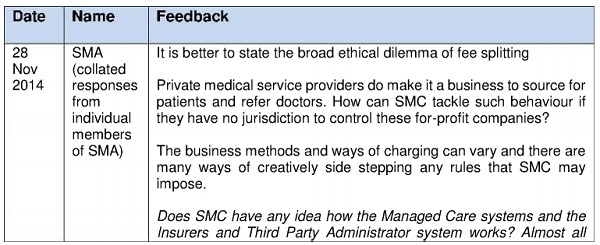Dr Wong Tien Hua
President
Singapore Medical Association
2 College Road, Level 2
Alumni Medical Centre
Singapore 169850
Dear Dr Wong,
RE: FEES CHARGED BY MANAGED CARE COMPANIES AND THIRD PARTY ADMINISTRATORS
- We refer to the letters of the Singapore Medical Association (SMA) dated 23 February 2016 and 22 March 2016.
- The role of the Singapore Medical Council (SMC) under the Medical Registration Act is to regulate the doctors' professional standards and behaviour.
- In an earlier draft of the revised SMC Ethical Code and Ethical Guidelines (ECEG), the Working Committee for the review of the ECEG had labelled such percentage fees as "fee splitting" and was of the view that it should not be allowed. What followed in the first consultation was feedback from stakeholders, including SMA members that SMC should not to interfere with business arrangements, especially when such fees are not deemed to be "fee splitting" in some jurisdictions (extracts of SMA members' collated feedback are appended below).

_2.jpg)
_3.jpg) 4. The SMC agrees with you that the regulation of these managed care companies and third party administrators (TPAs) does not come under the ambit of SMC. Neither can SMC identify business patterns that are of such high risk to professionalism that they ought to be prohibited on grounds of medical ethics, since the range of options is wide and there will always be creative ways to circumvent specific prohibitions.
4. The SMC agrees with you that the regulation of these managed care companies and third party administrators (TPAs) does not come under the ambit of SMC. Neither can SMC identify business patterns that are of such high risk to professionalism that they ought to be prohibited on grounds of medical ethics, since the range of options is wide and there will always be creative ways to circumvent specific prohibitions.
5. The approach and SMC's stand on this are as follows:
(a) Doctors who participate in managed care or TPA contracts must not allow any financial constraints or pressures inherent in such schemes to influence the objectivity of their clinical judgment in managing patients, such that the required standard of care is not provided. Should doctors be challenged as to whether they provided appropriate care, it is not a defence that the contracts they have entered into did not allow them to provide the necessary standard of care. Patients should not get differential treatments just because they are from companies which are involved in such contracts with doctors.
(b) Paying of fees is in and of itself not necessarily disallowed, provided in general, the sums reflect the actual work of the managed care companies or TPAs in handling and processing patients and that such fees must not be based primarily on the services doctors provide or the fees they collect from patients. SMC would deem unethical the sharing or splitting of fees with a referring doctor, merely for the privilege of being referred a patient, with no commensurate work done justifying such fees. Both doctors would then have behaved unethically. If a doctor splits fees with a third party who is not a doctor and has done nothing commensurate with the payment, the doctor would be deemed to have behaved unethically.
(c) Doctors must not pay fees that are so high as to constitute "fee splitting" or "fee sharing", or which impact their ability to provide the required level of care. Therefore doctors need to give due consideration to any contract before signing. Where the boundary is between a reasonable fee and "fee splitting" is a matter for judgment.
(d) If doctors pass such fees onto patients, doctors ought to be transparent about this with their patients and disclose this to them.
6. SMC is of the view that patients' best interests are compromised when:
(a) Patients are sent to doctors inappropriate to their needs, due to the doctors agreeing to pay fees to managed care companies or TPAs;
(b) Doctors under -treat patients due to financial pressures;
(c) Doctors over -treat patients to make higher revenues to cover the fees they must pay; and
(d) Doctors grossly over -charge patients in order to redeem high business costs due to such fees.
7. SMC understands why SMA prefers a "fixed fee", but is of the view that however fees are constructed, what is important is that the fee paid must not be based primarily on the services doctors provide or the fees they collect from patients. We believe this addresses the problem sufficiently without a need to specify how the fee should be derived.
8. We encourage SMA, as the profession's advocate, to engage the industry to bring about fairer practices as well as engage and educate doctors on how to handle such contracts without breaching their obligations to patients.
Thank you.
Yours sincerely,
PROF TAN SER KIAT
PRESIDENT
SINGAPORE MEDICAL COUNCIL